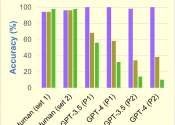A strategy to discern between real and virtual video conferencing backgrounds
Video-conferencing platforms such as Skype, Microsoft Teams, Zoom and Google Meet allow people to communicate remotely with others in different parts of the world. The COVID-19 pandemic and the social distancing measures ...









